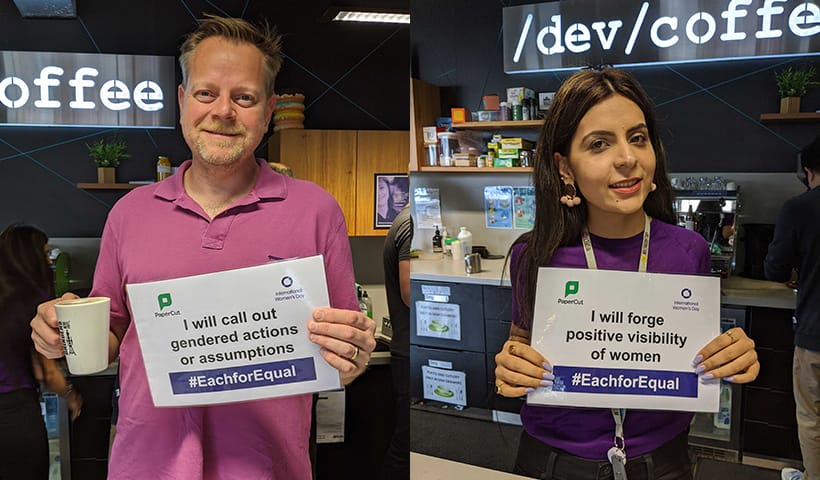An equal world is an enabled world.
That’s the theme for this year’s International Women’s Day , and we’ve been celebrating #IWD2020 all week.
We set up an IWD dedication space on our culture wall, hung up #EachforEqual posters, took selfies, ate cupcakes, and even organised a Wonder Woman screening complete with accompanying pizza party.
This isn’t PaperCut’s first International Women’s Day , and to us, it means more than festivities and celebrations. To find out what exactly, we asked our offices around the globe. We got a lot of input (I was just slightly overwhelmed) so we’ve split the responses in two parts!
In this entry, we focus on International Women’s Day’s personal significance and what gender equality means.
“Reflection, education, celebration and ideation”
What does International Women’s Day mean to you?
“Interestingly, in the country I’m from (Ukraine) International Women’s Day has always been a public holiday (for all, not just women:) )
“The day was about celebrating women in our lives and I always loved the intent behind it. I have lots of lovely memories of significant women in my life receiving flowers and gifts on that day and us all getting together over lunch or dinner and celebrating.
“It wasn’t until I got older and moved to Australia though when I saw this day play an important role in bringing the issues of gender diversity to light.” — Julie Starovoitova (People experience lead)
“We take one day to celebrate Women’s achievements and successes. Also, drive the world’s attention to the plights and pain of women in this very world.
“But, the fact we had to dedicate one day to draw the world’s attention to one gender is shameful in itself. Women are almost 50% of the population and still we need to show our presence and fight for our existence.
“But, I guess to end the patriarchy mindset we need to start from somewhere, then let it be International Women’s Day.
“I will wait for that time where we do not need a day reserved for us and it is in people’s mind by default.” — Shalini Sharma (Senior product engineer)
“It’s a time for reflection, education, celebration, and ideation.
“Reflection: Taking the time to stop and think about whether I’m being true/authentic to myself? Am I being seen and treated as an equal? What have we learned about in the past year? What am I doing to make a difference as a woman in a male-dominated tech workforce?
“Education: Share stories, understand what is happening in your environments i.e. community, workplace. Also, listen and seek out ideas/opportunities from companies that have been there, done that.
“Celebration: Celebrate the wins and acknowledge the changes that have come about thus far. Don’t take even the small steps for granted.
“Ideation: What have I seen/heard that’s inspiring and has motivated me? What have I learned that I can adopt?” — Rebecca Ballantyne (Head of global marketing)
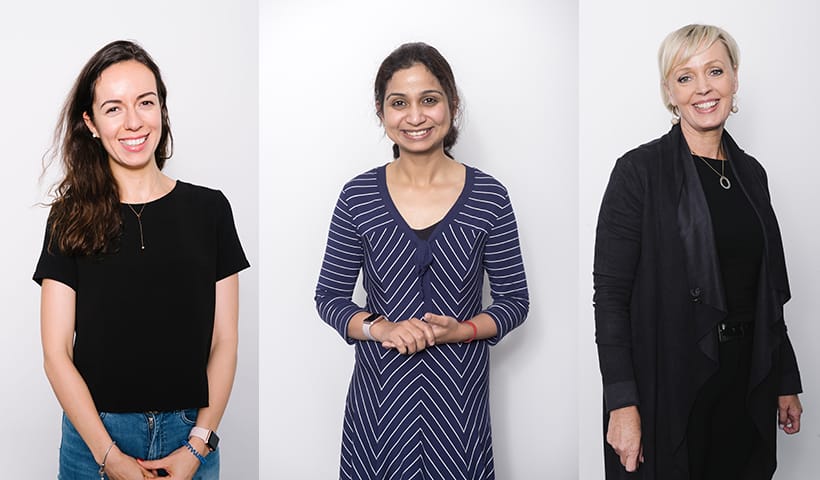
From left to right: Julie Starovoitova; Shalini Sharma; Rebecca Ballantyne
“We are all different, which makes us all equal”
Why is this year’s IWD theme, Each for Equal, an important message?
“I find this a pertinent message as it emphasises the role each of us, individually, plays in creating a world of gender-equal workplaces, boardrooms, power in government, media coverage — the list goes on.
“Disappointingly, you can often feel alone or part of a small group of people pushing forward for equality, the reality, however, is that it requires everyone.” — Sophie Graves (People experience advocate)
“I think it’s important to remember that no one person, group or organisation can ensure equality for all. All of us need to focus on it daily, through the words we use, the way we treat people and the way we make decisions — especially when your business decisions affect people.” — Laura Paton (Talent acquisition manager)
**“**It encapsulates the action people can take to make ongoing, long term changes, rather than short term symbolic ones just for IWD itself. It is all about each of us changing our behavior, words and mindset, because together this will add up to more equality.” — Andrew McCrae (Product engineer)
“Challenging the status quo or calling people out on their unconscious bias can be daunting. EachforEqual is such an important message to bring these difficult conversations to the front and help change how women are seen and treated across the world.” — Dawn Chisholm (People experience advocate)
“We are all different, which makes us all equal. We all have different skills and weaknesses that make us who we are. Every one of us. This should make us come together and celebrate these differences. When women and men have equal rights and opportunities the results are stronger economies and improved quality of life for everyone.” — Anshul Satija (Technical support engineer)
“Imagine a world where a woman can walk into any environment and feel safe, confident and valued. This isn’t the current viewpoint… so let’s work at making change.
“Only when the statistics change showing the imbalance of power between men and women (from a local, national, and global perspective) do we then know we’re getting close to reaching our goal of equality.
“EachforEqual is the power of women uniting together for a common purpose, collectively we are a force to be reckoned with. Think of the ‘Me Too’ movement for example. If we can; spend time sharing, understanding challenges, educating, and supporting each other to bring about change.” — Rebecca Ballantyne (Head of global marketing)
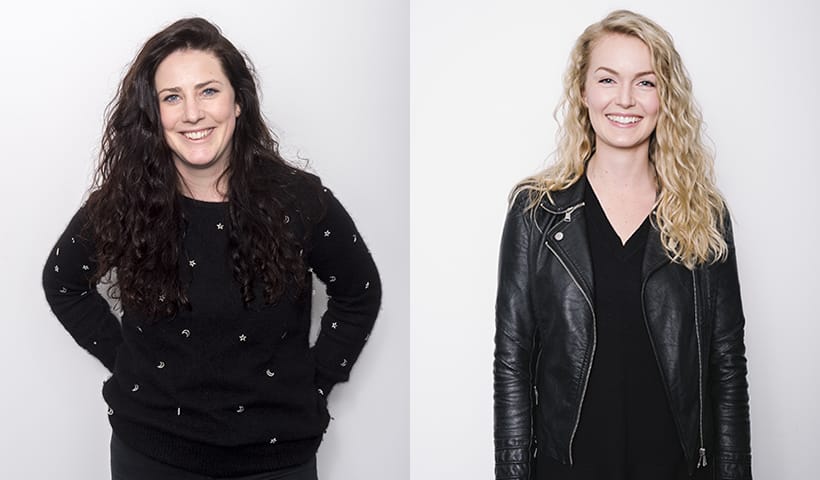
From left to right: Sophie Graves; Laura Paton
“You can’t be what you can’t see”
Why is it important to celebrate women’s achievements?
“It took me until the age of 25 before I had someone in the workplace who I admired and for the first time could imagine what was possible as a woman in the workplace. She was courageous, intelligent, compassionate, and ridiculously good at her job in a way that was dedicated but did not consume her.
“25 years old is far too old to have a role model who helps you to understand what you could be capable of. Through celebrating women’s achievements we elevate, praise and create a world full of possibilities for our peers, friends, sisters, daughters, etc.” — Sophie Graves (People experience advocate)
“It’s pretty common to build your life around numerous stereotypes you grew up hearing about, so I think hearing about women who have broken through those stereotypes, have succeeded where few women have in the past, or are equally impressive as their male counterparts but perhaps haven’t received as much recognition, is inspiring for the younger generation and hopefully promotes a new norm — that women and men can both do anything they set their mind to.” — Laura Paton (Talent acquisition manager)
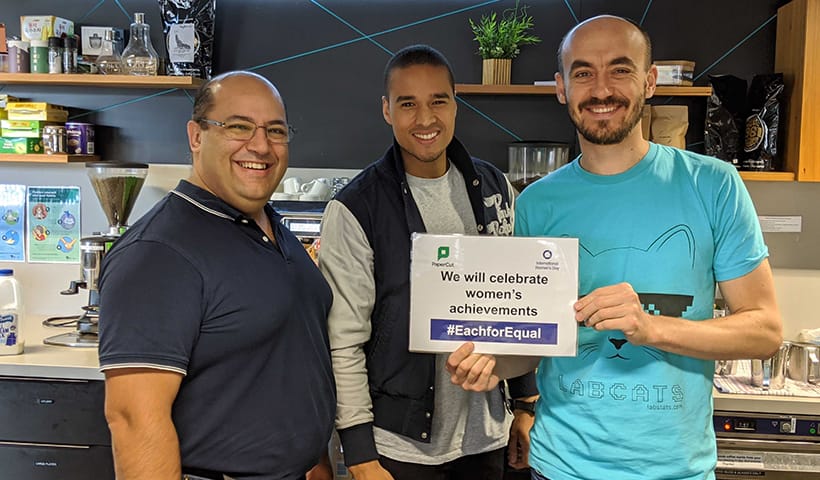
From left to right: Matt Drago; Matt Daniels; Willem Groenewald
“I recently attended this ICT Women for Breakfast Talk about the importance of women, and this is why we should celebrate women’s achievements, to show how important women are in all aspects of our lives.
“A very inspiring quote I heard in the talk was: ‘Women will change the nature of power, rather than let the nature of power change you.’
“Although both men and women can suffer from ‘Imposter syndrome’, women feel it more often and with more intensity.
“The ‘impostor’ believes they’re living a lie and will be discovered sooner or later. They feel they’re not as good for the job as others think and that their fraudulent success will be over as soon as people find out. We surely can help the women we work with surpass this limiting experience by letting them know what a good job we sincerely believe they’re doing.
“Women are constantly discredited, overlooked, and, in some awful cases, cheated out of their real deserving place in history. It’s also a time when we focus on learning more about the female perspective on big movements in human history.
“Shining a light on women’s contributions makes us equal humans, equally worthy of being remembered for our deeds.” — Anshul Satija (Technical support engineer)
“Men are pretty good at blowing their own trumpet and, a big generalisation here, I don’t think women are as good at actively promoting themselves or their achievements. Taking the time to reflect, and giving them a platform to share and celebrate, supports acknowledgment and recognition for their contributions, building pride and confidence to say, ‘Hey I did a great job’.” — Rebecca Ballantyne (Head of global marketing)
“There is this saying, ‘You can’t be what you can’t see’. And whilst I don’t 100% agree with that, the importance of role models can’t be underestimated. If we look around and don’t see examples of women achieving amazing things, how can we believe that we as women, our daughters and all other girls and women in the world can do great things too? Celebrating women’s achievements can inspire us and help see what is possible and maybe even give us the courage to pursue our dreams too.” — Julie Starovoitova (People experience lead)
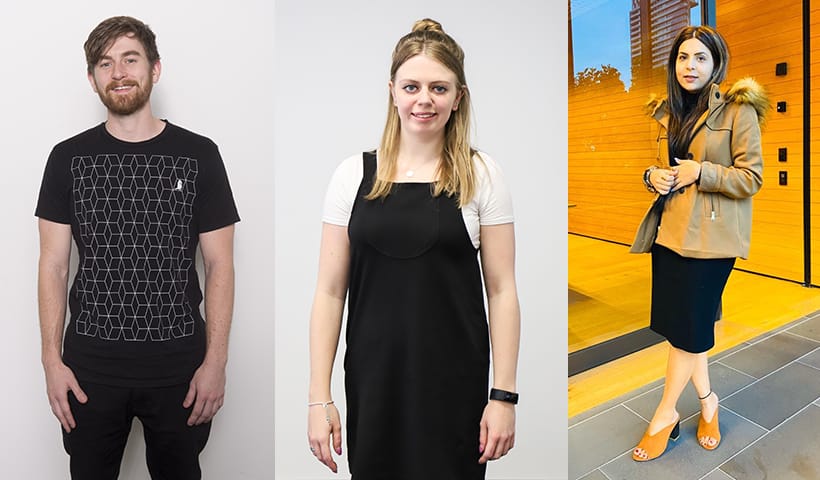
From left to right: Andrew McCrae; Dawn Chisholm; Anshul Satija
Part 2 coming soon
Stay tuned for the second installment to see what International Women’s Day means to the workplace and what we hope the future of gender equality holds in store.
